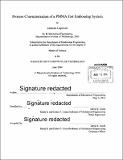Process characterization of a PMMA hot embossing system
Author(s)
Luginbuhl, Katharine
DownloadFull printable version (16.99Mb)
Alternative title
Process characterization of a Poly(methyl methacrylate) hot embossing system
Other Contributors
Massachusetts Institute of Technology. Department of Mechanical Engineering.
Advisor
David E. Hardt.
Terms of use
Metadata
Show full item recordAbstract
Microfluidics devices are important both for research use and medical application. To create these microfluidics devices, the hot embossing process is commonly used. In order to characterize this process to enable cycle to cycle control, a small-scale system was developed, using a hot embossing machine, taping machine, and functional tester previously created. Parts were moved between these machines with an Epson GlO SCARA robot, which provided the appropriate efficiency and accuracy. This system was able to produce embossed parts with a takt time of less than 135 seconds, and over 1000 of such parts were produced. The system was analyzed to determine potential sources of variance, considering both things that would alter the part and things that would alter the measurements. This enabled the system to be run in a state of statistical control, which in turn allowed for a designed experiment to be done on the system. This designed experiment determined that the forming temperature, forming force, forming time, as well as the square terms for the forming temperature and forming force and the cross-terms of forming force with forming temperature and forming time with forming temperature, were all statistically significant in the formation of parts. With this data, cycle-to-cycle control can be enabled in the future.
Description
Thesis: S.M., Massachusetts Institute of Technology, Department of Mechanical Engineering, 2014. Cataloged from PDF version of thesis. Includes bibliographical references (pages 157-158).
Date issued
2014Department
Massachusetts Institute of Technology. Department of Mechanical EngineeringPublisher
Massachusetts Institute of Technology
Keywords
Mechanical Engineering.